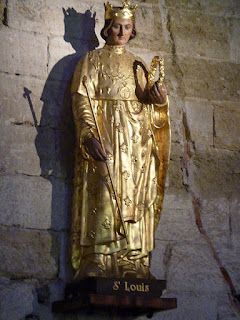Although Geoffrey of York may have seemed like his father's favorite (
despite his illegitimacy), Henry II's other sons were generous in their contempt, offering him choice offices but denying him some of the accompanying privileges. Were they pushing him to rebel so they could imprison him for treason? Or just practicing cruelty because of their father's preference for their half-brother?
After Richard's death, John became king, and restored Geoffrey to the position of Archbishop of York, but continued collecting the revenue of the properties associated with that position until Geoffrey returned from Rome. Richard had prevented him from returning to England after Geoffrey's visit to the pope to try to restore his position. Once he returned, Geoffrey and John spent the rest of 1199 in each other's company. As the two of Henry's sons who had not ever rebelled against their father, they had some things in common.
Geoffrey strained the relationship when, in 1200, he refused the carucage, a tax due the king. To be fair to Geoffrey, Richard as well as John had at times prevented him from collecting the revenue due his position in York, and Richard had "fined" him more than once. Geoffrey was probably financially more disadvantaged than any Archbishop of oak before or since. So Geoffrey and John fell out, but were reconciled at the funeral of Hugh of Lincoln in November 1200. Since Geoffrey afterward continued to prevent the collection of the king's tax, excommunicating the sheriff whose duty it was to collect it, their truce failed, upon which John demanded the payment for the office of Sheriff of Yorkshire (which Geoffrey had purchased during Richard's reign on a "promissory note" of 3000 marks. Geoffrey of course could not afford that, so in May 1201 he lifted the excommunication and made a payment to calm John down. Then they started clashing over ecclesiastical appointments in York. Geoffrey also clashed with some of the monasteries in his diocese over appointments.
This back-and-forth continued. Geoffrey tried to reconcile permanently with John in 1206, and even had his properties (and associated revenue) returned to him. But in the following year the clergy of England objected to royal taxation. Can you guess which prelate led the charge? He also started excommunicating anyone in the diocese who tried to collect the tax. John re-confiscated his properties. Pope Innocent told John to return them, but Geoffrey had fled to France.
Geoffrey could have had a much more comfortable life than anyone could have expected, given his lack of legitimacy. His early life suggested a lazy and self-indulgent approach to life in the church, but he could have kept quiet and just quietly supported whichever member of his royal family was on the throne at the time. Instead, he seemed to "pull a Becket" and tried to throw his weight around as an archbishop. (To be fair, Becket seemed to change his attitude once he became archbishop because he felt obligated to champion the Church over Henry's whims, whereas Geoffrey's behavior seemed to be motivated by gathering as much money as he could.) Geoffrey even fought with the Archbishop of Canterbury over who was more important.
He died in Normandy on 12 December 1212 and was buried at the monastery where he had taken refuge, near Rouen.
It is not fair, however, to assume Geoffrey had no redeeming qualities (outside of loyalty to his father). The picture above is an illustration of Cain and Abel—appropriate for this post, I think. It is from the Psalter of St. Louis, which was used to teach the future Louis IX of France how to read. It is thought to have been created thanks to Geoffrey, and I'll talk more on it tomorrow.


